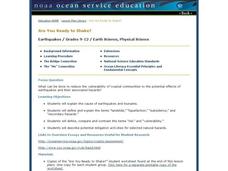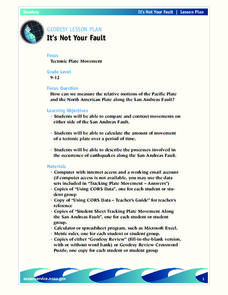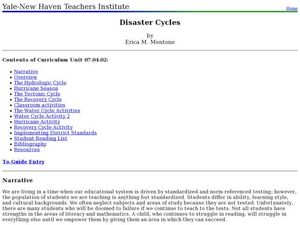Curated OER
Are You Ready to Shake
Learners examine earthquakes and tsunamis. In this Earth science lesson plan, students investigate the causes and hazards associated with earthquakes and tsunamis.
TED-Ed
Bringing a Pop-up Book to Life
Breath life into the pages of a text with this instructional video on creating pop-up books. From choosing a topic, through the planning and creation phases, this video examines how to develop engaging visual presentations that reach out...
American Museum of Natural History
Volcanoes Magma Rising
Get ready for an explosive lesson! Learners read and interact with an online lesson describing the characteristics of volcanoes. They study specific historical volcanoes as well as the science of volcanic eruptions using animations and...
Discovery Education
STEM Camp—Urban Infrastructure
Build a bridge to learning in a STEM-aligned unit about urban infrastructure. Young engineers explore the many aspects of civil planning and design in a five-day unit. Content includes the challenging aspects of balancing building with...
Curated OER
the biggest Plates on Earth
Students understand the movement of tectonic plates. In this tectonic plates lesson, students access prior knowledge of convergent, divergent, and transform boundaries. Students discuss energy transfer involved in plate motion. ...
Curated OER
Life Along the Ring of Fire
Students research geological forces that create the Ring of Fire and its effects on cultures. They write reports on how natural disasters influence societies.
Curated OER
The Basics: Earth Science
Middle schoolers define terms and watch a segment from a film. In this scientific theory lesson students work in small groups and draft a theory that was discussed in the program.
Curated OER
Formation of Volcanoes
Ninth graders explore the process of different volcanoes and how plate tectonics plays a role. In this volcanic activity students complete several assignments on plate tectonics.
Curated OER
Exploring Alaska's Seamounts - Volcanoes, Plates, and Chains
Students examine the formation of seamounts in the Gulf of Alaska. For this seamount lesson, student focus on how the Axial-Cobb-Eikelberg-Patton chain was formed. They learn the associated vocabulary, and watch a teacher demonstration...
Curated OER
Name That Volcano
Students research volcanoes. In this volcanoes lesson, students visit websites with worksheets about the terms for volcanoes and volcanic eruptions in the world. Students complete the work online and play a game for volcano names.
Environment Agency - Abu Dhabi
Earthquakes
What causes earthquakes? What are the effects and impacts of earthquakes? How are earthquakes measured? If there was an earthquake on Mars, would it still be considered an earthquake? Class members will find the answers to these and many...
Curated OER
Plotting Earthquakes
Learners plot earthquakes on a map. In this lesson on earthquakes, students will explore recent earthquake activity in California and Nevada. Learners will plot fault lines and earthquake occurrences on a map.
Curated OER
Life of an Island: From Mountain to Atoll
Students research the evolution of a volcanic island from origin to erosion. They determine the relative ages of the Northwestern Hawaiian Islands given their position in the archipelago.
Curated OER
Rock Cycle
In this rock cycle worksheet, students simulate the changes that occur during the rock cycle using a sugar cube. They use the sugar cube to represent a rock and perform changes on the sugar cube that represent the stages of the rock cycle.
Curated OER
Hazards: Fifth Grade Lesson Plans and Activities
After comparing earthquake and volcanic hazards to one another, fifth graders take a closer look at damage associated with a volcanic eruption. They then create a simulation of mudslides due to a volcanic eruption. Using different...
Curated OER
It's Not Your Fault
Students determine how to measure the movement of the plates along the San Andreas Fault. Students calculate the movement of tectonic plates over a period of time and describe the processes involved in the occurrence of earthquakes along...
Curated OER
Converging Earthquake!
Students identify the fault lines and tectonic plates on the map. In this earth science lesson plan, students simulate landscape formation using robots. They take a quiz at the end of the lesson plan to demonstrate mastery.
Curated OER
Know Your Boundaries: Earthquake Lessons in the Classroom
With all the recent attention on Haiti, and now Chile, it is the perfect time to teach your students about earthquakes!
Curated OER
Disaster Cycles
Students explore what causes natural disasters. In this environmental lesson plan, students will spend four weeks using activities to help in their understanding of the Hydrological Cycle, Hurricanes, Plate Tectonics, and the Recovery...
Curated OER
Volcano Lesson Plans
Volcano and earthquake lessons can provide a great way to link science instruction to current events.
Curated OER
Buildings Have Lives, Too: Disasters and Their Effect on People
Students research natural disasters and their lasting effect on both people and the environment. In this environmental science lesson, students complete a group project on a natural disaster of their choosing. Students examine multiple...
Curated OER
Normal (dip-slip) Earthquake!
Students label the fault lines and tectonic plate boundaries on the world map. For this earth science lesson, students simulate ocean floor formation using CEENboTs. They explain the causes of earthquakes.
Curated OER
Continents Adrift
Students examine how tectonic plates change the Earth's land. In this geology lesson, students are divided into small groups to construct a continent puzzle. Students use transparency pieces to demonstrate how Africa and South America...
Curated OER
It's Not Your Fault
Young scholars study the San Andreas Fault, calculate its movements, and compare the movements on both sides. In this earthquake lesson students use the Internet to track movement, and calculate movement using a spreadsheet.

























